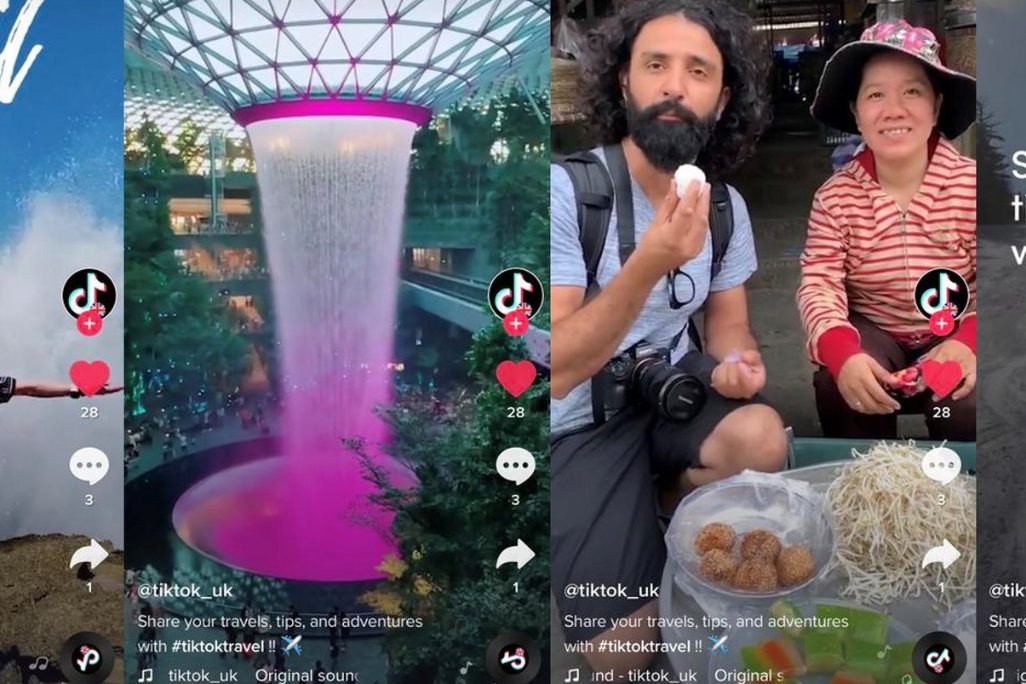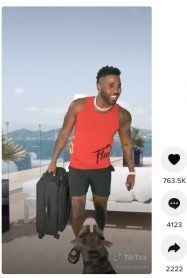Skift Take
TikTok is finally becoming a promising tool for travel marketers. But brands should expect a lot of trial and error. This social video app isn't just Instagram or YouTube by another name.
Social video app TikTok is best known for animals performing tricks, people doing stylized and hip dance moves, and random events such as a baby being born mid-flight. But TikTok’s usefulness for travel marketing to Gen Z and younger millennials is becoming more apparent for U.S. travel brands who are seeing the success of foreign brands on the platform.
Delta Air Lines this week launched its first TikTok campaign in the U.S. The carrier asked app users to post a short video about their favorite trip and tag the post with #FavoriteTripChallengeHashtag. The app said the campaign garnered over 19.5 million views in its first 36 hours, thanks partly to a partnership with TikTok.
Several U.S. travel brands had hesitated to engage with TikTok in contractural ways until recently. Executives were nervous about some uncertainty about the app’s status in the U.S. A year ago, the Trump Administration attempted to effectively banish the app from Apple’s and Alphabet’s Google app stores, but courts prevented the ban. In June, U.S. President Joe Biden revoked the related executive orders, dispelling most of the clouds.
During the uncertainty, a few U.S. travel brands turned to “organic” efforts, engaging TikTok users via posts without paying the company to promote or coordinate campaigns, such as United Airlines‘ April TikTok video encouraging travel and touting exclusive discounts for Gen Z travelers.
This year Marriott’s loyalty program Bonvoy ran an organic “Travel Makes Us” campaign, encouraging the community to create their own travel videos using Marriott’s custom song and hashtag montages. Posts with the hashtag #TravelMakesUs, such as this one, collectively drew 4.3 million views.
Join Us at Skift Global Forum in NYC September 21-23
But U.S. travel brands have this year also begun having formal partnerships with TikTok to improve their results. American Airlines on August 2 began letting passengers access TikTok on their phones in-flight for up to half an hour without having to purchase Wi-Fi access if the planes are Viasat-equipped narrowbody aircraft.
In June, Expedia Group-owned Hotwire launched the first travel-related hashtag challenge in the U.S. The brand paid approximately 20 creators to create short videos showing why they were ready for a getaway and where they would like to go. The best video had a chance to win a $50,000 trip on a private jet. Hotwire hired pop star Jason Derulo, who has more than 47 million followers on TikTok, as a contest judge.
Currently, the hashtag #HotwireHotelGoals has 11.7 billion views. Yes, billion with a b. That’s thanks to a partnership with TikTok to promote the visibility of the related video clips. Digiday, an advertising news service, estimated that the cost of working with a top social media influencer on a hashtag challenge can reach the six figures.
In May, Expedia Group’s Orbitz brand — which recently began emphasizing its search filters aimed at helping LGBTQ+ travelers plan trips — paid a few creators to create ads, such as this one from influencer Everett Williams, to support a hashtag challenge.
U.S. Brands Playing Catch-up
Travel brands outside of the U.S. have long appreciated the power of TikTok videos to raise awareness about their brands.
Travel-related hashtags for videos on the app draw many views, according to TikTok, which launched in 2018. Examples using data from countries outside of China (which has a different and older app, Douyin, with different data) include #travel having drawn 49.3 billion views, with 3.8 million videos created under the hashtag #travel as of May 2021. The hashtag #tiktoktravel has drawn 24.5 billion views; #wanderlust has attracted 1.1 billion views, and #traveldiaries has generated 2.2 billion views.
Roughly half of TikTok’s audience is under age 34, according to the consultancy Omni Core Agency. These young independent travelers may be among the first tourists to embark on international travel as restrictions ease, according to data analytics firm GlobalData.
But these younger consumers may not have much disposable income yet to plan trips and the types drawn to TikTok may be, for lack of a better word, changeable in their tastes.
Marketing on TikTok Is Unpredictable Due to Its Different Formula
A couple of social media influencers have reported that TikTok travel marketing can be “unpredictable.”
The unpredictability partly comes from the TikTok algorithm, which favors “long-tail content.” It appears to be different from the kind used by U.S.-based social media platforms, which have tended to favor content with mass appeal in a traditional, crowd-pleasing sense.
Travel marketers that try to just repurpose content that was already popular on Instagram or other platforms on TikTok may be disappointed because TikTok works differently. TikTok essentially makes sure that a video created by anyone, no matter how unknown, will be exposed to at least some users. It doesn’t just re-broadcast what has already proven popular. The more a user watches and engages with content, the better the app gets at pushing to the user videos that may match their interests, hobbies, or tastes.
Not every travel marketing attempt on TikTok is a wild success either. In late August, the Kenya Tourism Board, the International Fund for Animal Welfare, and Conservation International are teaming up to broadcast on TikTok a live wildlife event in the Maasai Mara National Reserve in Kenya to raise awareness about the need for wildlife protection.
The event was hosted intermittently over a few days on TikTok’s official Africa-themed page and pushed into many people’s feeds. But the hashtag challenge didn’t come up with much content around either the Great Wildebeest Migration or conservation in general, according to Skift’s anecdotal searches.
What’s more: TikTok isn’t welcome everywhere. India banned the app last year. And many travel marketers remain cautious. A survey of 216 travel marketers worldwide found 97 believed that budget or ad spend recovery wouldn’t happen until between 2025 and 2030 — and another 38 travel marketers thought the recovery wouldn’t happen until “after 2030.” The survey was by the consultancy WBR (Worldwide Business Research) Insights and travel ad tech firm Sojern.
Another problem is, broadly speaking, that the ad tech companies favored by many travel businesses haven’t yet joined TikTok’s marketing partner program, making it trickier to run coordinated, cross-channel campaigns.
Travel Brands Try TikTok Marketing With Some Success
Still, some mid-market travel brands in Europe, in particular, have been ahead of the world in experimenting to see what works on TikTok. Some well-timed campaigns hit a chord with app users. Baleària, which offers a ferry service in Spain connecting popular destinations such as Mallorca and Eivissa with ports such as Barcelona and Valencia launched this summer a hashtag challenge to encourage potential passengers to share their ideas for the dream vacation.
To make things easier for brands to market to users, TikTok has been coming up with additional tools. In July, it launched a “spark ads” product with a native ad display format. The ads let brands boost the number of views of organically created posts or share relevant content posted by creators in the feeds TikTokk can actively push users.
The potential for travel brands to use the new ad format may be material, though brands must experiment to find out. In theory, if an organic piece of content from a creator gained traction and was on-message for a travel brand with a TikTok for Business account, the brand could amplify the post’s visibility amongst user-generated content through the paid service.
Yet of now, no travel-specific brand has used the service yet, a TikTok spokesperson said. Regardless, the pandemic has prompted a rethink in the travel creator economy, as tourism boards and brands reinvent their business models and messaging priorities — as Skift recently analyzed in “Travel’s Creator Economy Resets for Next Boom.” For more context, see yesterday’s story Social Media Influencers Sync With Startup Tools to Sell Travel.
The Daily Newsletter
Our daily coverage of the global travel industry. Written by editors and analysts from across Skift’s brands.
Have a confidential tip for Skift? Get in touch
Tags: Digital Marketing, social media, social media marketing, tiktok
Photo credit: Screenshots from TikTok, the short-video social media app, which has growing usefulness for travel marketing as U.S. travel brands. TikTok

